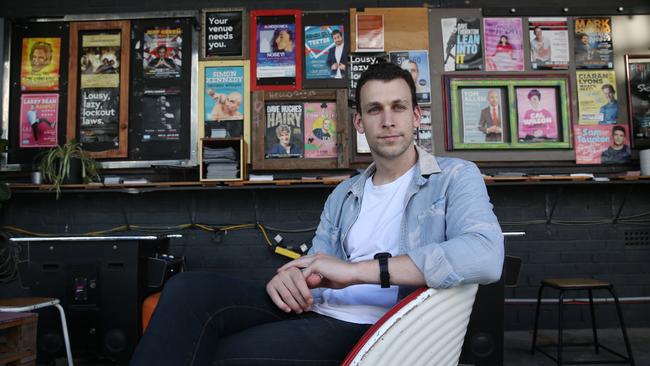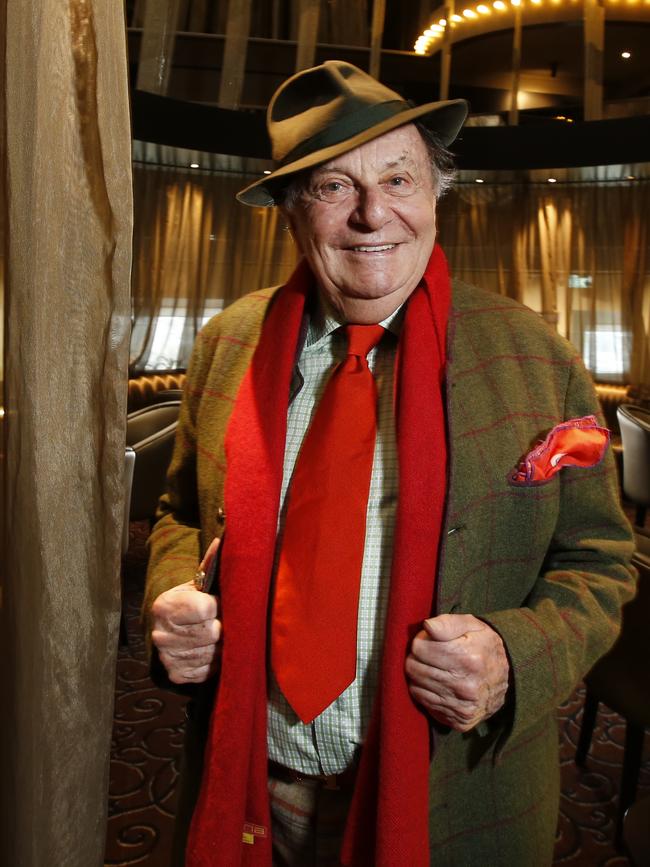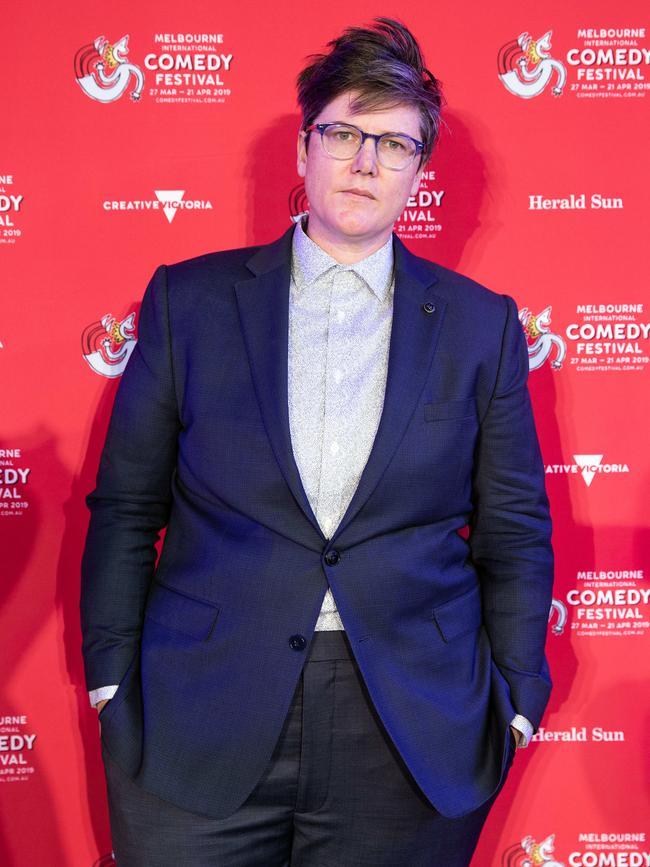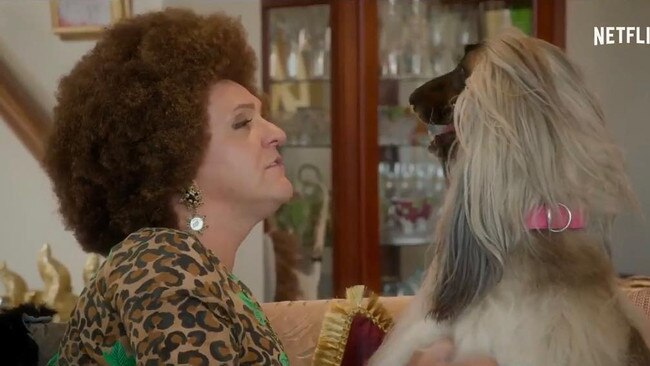New Comedy’s warning: don’t cross the punchline
The comedy now in vogue is not entertainment for the troops, it’s simply another front in the culture war.

Don’t you dare deadname the Barry Award. The top honour has transitioned, after a bit of a tizz, and piled on the wordage to become the Melbourne International Comedy Festival Award. It’s beyond a joke.
Last year a journalist asked Barry Humphries if offence-ready transgender activists had got around to monstering Dame Edna. Perhaps unwisely, because he is the Buzz Aldrin of gender-bendery, Humphries dismissed transgenderism as “a fashion” and wondered “how many different kinds of lavatory can you have?”. On cue, transgender outrage was cranked up until, this month, Barry was expelled from the comedy safe space.
In fact, Humphries is “not a comedian” at all but an “inhumane dick biscuit”; at least that’s the opinion of Tasmania’s Hannah Gadsby, who won the Barry in 2017 but now appears to be post-humorous.
Would The Adventures of Priscilla, Queen of the Desert have been imaginable without the outlandish matron of Moonee Ponds? And might the lack of early childhood exposure to Dame Edna explain why Sydney’s migrant west voted against same-sex marriage?
Whatever, Humphries irks puritans of any stripe, always has.


In 1965 he created Neil Singleton, a turtle-necked left-intellectual trendoid. On tour from Britain, Humphries was bailed up by an apoplectic journo in Sydney, who declared: “There’s a cultural renaissance going on here, y’know … You’re living in the past, mate, and so are your characters … A lot of people I know are very worried about the direction your stuff is taking. We think it lacks … relevance!”
Sound familiar, Chris Lilley? Guardian Australia has devoted three articles, at latest count, to Lilley’s new Netflix show, Lunatics, whose characters include a “loud and proud lesbian woman” who is a celebrity pet psychic.
It’s possible to read hidden approval in the Guardian’s headlines — “utterly unrelenting”, “hard not to feel personally insulted” and “thankfully no blackface” — but the truth is that Lilley was already a marked man for breaking progressive taboos with his delinquent person of colour, Jonah.
Hence the Guardian’s strange, race-obsessed verdict: “There are no brown, black or yellow faces in Lunatics, despite a trailer appearing to show the comedian in brownface (this character, the ‘pet psychic’ Jana Melhoopen-Jonks, as it turns out, is a white South African with a tan). That is, as they say, progress of a kind. But one of the underlying problems in Lilley’s humour still remains: he continues to punch down, making fun of people who have not been afforded the same privileges as he.”
For the Guardian, blackface is verboten but white-tan face is kosher. It’s skin politics and tribal power plays that count, not the laughs jagged by a gag.
Not long ago, gender liberation took the form of a bland unisex identity. Now it seems a dress-ups game, but grim and humourless. And if comedy and politics have often been co-conspirators, there used to be glorious rebels who’d let the side down for a laugh.
The “bad Bohemian” Jaroslav Hasek was a communist hero for his Good Soldier Svejk stories skewering the Austro-Hungarian Empire. He even spent two years in war-torn Russia as a Bolshevik commissar. But his satirical legacy includes the character Comrade Yerokhimov, who is always threatening to have everyone shot, only to protest “it was just a joke, my little lovebird” when control of the town is wrested away from him.

Now, much of the comedy in vogue is not entertainment for the troops, it’s simply another front in the culture war. This gives away the joke. As one Twitter parody put it: “If you find yourself laughing at comedy, it’s probably not sufficiently progressive.”
Jokes that work often draw their charge from radioactive taboos (although if your book title’s going to be “This way for the gas, ladies and gentlemen”, it helps to be a concentration camp veteran).
Today, Diversity Inc’s rules, prohibitions and strictures — not to mention its absurdities — ought to be an endlessly renewable supply of energy for comedians keen to amp up.
One plugged-in Twitter troll was the “genderqueer Muslim atheist” Godfrey Elfwick, who inexplicably was “born white in the #WrongSkin”.
When the film 12 Years a Slave came out, Elfwick complained: “Typical of Hollywood to cast a black actor in a stereotypical role as a slave. Why not 12 Years a Bank Manager?”
Another tweet: “I’ve been secretly putting hormone blockers in my nephew’s Dairylea Lunchables for the past few months. She’ll thank me for it in a few years, you mark my words.”
And after the miraculous emergence of the soccer team from the cave in Thailand: “Two British white males at the head of this rescue mission. Their privilege is staggering. Ability counts for shit when there’s zero diversity. I demand they be replaced with two differently abled transgender people of mixed race to offer those children a more empowering experience.”
Twitter silenced Elfwick permanently last year and although he has inspired others, they are not as successful. Satire struggles to outdo the crazy contortions of reality.
Ukraine, facing an existential threat, has just elected a president best known as an actor who played an ordinary man turned accidental president.
Last week US President Donald Trump, troller-in-chief, had a chat about social media niceties with the boss of Twitter, the platform that reliably makes debate deranged. In Australia, a football player is in trouble for Bible-bashing, not female-bashing. And a physics professor had to go to court for vindication after university bureaucrats trawled his emails for dirt, then sacked him for breaching a “no satire” directive and calling their conduct “Orwellian”.
Offshore, the great Gadsby is the toast of The New Yorker for her “funny, furious anti-comedy” Nanette. Singled out for praise was the sheer range of the show — “everything from coming out in a virulently homophobic environment to being misgendered in public”.
With one bound, Gadsby had leapt free of the “not-so-subversive container of a joke”. No wonder she says: “I have a responsibility to make you laugh … but I’m not in the mood.”
You have to go back to university to understand the mood swing that gave us “grievance studies” and identity politics, a world view in which we must tirelessly unmask the power plays of white heteronormative chaps and other designated oppressor groups, thereby cheering up designated victim groups.
This stuff has developed near immunity to satire, making life miserable for those who take the piss.
Consider two journal articles. The first trumpets “the conceptual penis as a social construct”.
Its thesis: “Anatomical penises may exist, but as pre-operative transgendered women also have anatomical penises, the penis vis-a-vis maleness is an incoherent construct. We argue that the conceptual penis is better understood not as an anatomical organ but as a social construct isomorphic to performative toxic masculinity.”
The second paper is headlined “Glaciers, gender, and science: A feminist glaciology framework for global environmental change research”.
It promises: “Merging feminist postcolonial science studies and feminist political ecology, the feminist glaciology framework generates robust analysis of gender, power, and epistemologies in dynamic social-ecological systems, thereby leading to more just and equitable science and human-ice interactions.”
Both these papers were published; only one is a hoax.
Approaching next month’s Sydney Comedy Festival in this disoriented spirit, the search begins for the voice of a funny future. “Identity Steft” — one of 12 fresh and upcoming acts — looks doubtful. “Ibis” — a person in a bin-chicken costume — does a vox pop of Mardi Gras folk and although they talk about “fun”, it’s not funny. Another performer is hailed as “one of Canberra’s funniest people” and that really is funny.
The act that seems hopeful but normal, in a funny way, turns out to be a cancer survivor and St Kilda kid with Yiddish in the family, Michael Shafar, 28, who jokes about not drinking, not doing drugs and consolidating super accounts — obviously a guy with an eye on the future.
He tells The Weekend Australian no topic is off-limits for jokers — “just so long as you do it in a way that is clever and original. Social justice warriors, for example — people have been making fun of them on stage for ages”.
“But when comedians are punching down, the material doesn’t seem to work because audiences don’t feel comfortable laughing at the expense of a minority who has been oppressed.”
So, comedy’s not a gag or two away from death. It’s just that mindless sniping from diversity cops may be a perpetual irritant, like terrorism in Waleed Aly’s apt turn of phrase.
Luckily, comedy has its own counter-terror experts such as Ricky Gervais, who ridiculed Hollywood’s impostures and pieties at the Golden Globe Awards 10 years ago and kept being invited back. He has a new Netflix show, too. In After Life, he plays a depressed widower who sets out to punish the world: “I do and say what the f..k I want and then, when it all gets too much, I can always kill myself — it’s like a superpower.” A good credo for a comedian who makes no apologies, although some may find his latest character slightly less repellent than usual, which is not necessarily a problem.
Gervais once told a fellow comedian: “Someone not getting your joke isn’t your problem, it’s theirs.
“They assume I’m punching down and they assume I’m making fun of whatever the victim is in this joke, which isn’t true, because a joke about someone doesn’t have to be pro or anti, it can be either, it can be neither. It can punch nowhere, it can be a pun. You have to take every single joke on its merit.”
Gervais has no children of his own, gets around with a cute baby photo of Hitler on his phone, and takes obvious pleasure in making people laugh about thought crimes they would never admit to. That’s a kind of social justice.




To join the conversation, please log in. Don't have an account? Register
Join the conversation, you are commenting as Logout